人教版九年级英语第六单元知识点总结
人教版九年级英语Unit6知识点总结
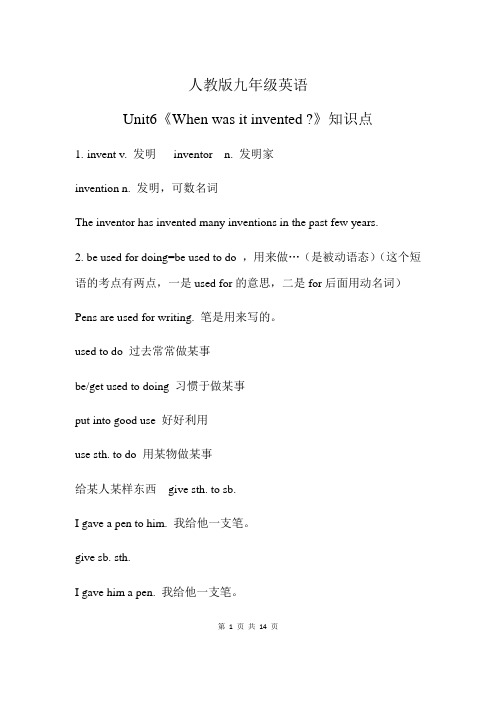
人教版九年级英语Unit6《When was it invented ?》知识点1.invent v. 发明inventor n. 发明家invention n. 发明,可数名词The inventor has invented many inventions in the past few years.2. be used for doing=be used to do ,用来做…(是被动语态)(这个短语的考点有两点,一是used for的意思,二是for后面用动名词)Pens are used for writing. 笔是用来写的。
used to do 过去常常做某事be/get used to doing 习惯于做某事put into good use 好好利用use sth. to do 用某物做某事给某人某样东西give sth. to sb.I gave a pen to him. 我给他一支笔。
give sb. sth.I gave him a pen. 我给他一支笔。
第 1 页共14 页pass/offer /send/show/write/bring/sell/lend/serve/ tobuy/cook/make/get/sing/prepare for4. all day 整天all evening/night the whole day5. salty adj. 咸的salt n. 盐sour/sweet/bitter/hot/salty酸甜苦辣咸6. by mistake 错误地(犯错是:make mistakes=make a mistake,这些常见的短语大家务必要掌握)I took the umbrella by mistake. 我不小心拿错了雨伞。
7. by accident/chance 意外,偶然(常见短语,考的最多的是它的意思)I met her by accident at bus stop.我在公共汽车站意外地见到了她。
人教版英语九年级全册单元unit 6 知识点+测试卷+思维导图
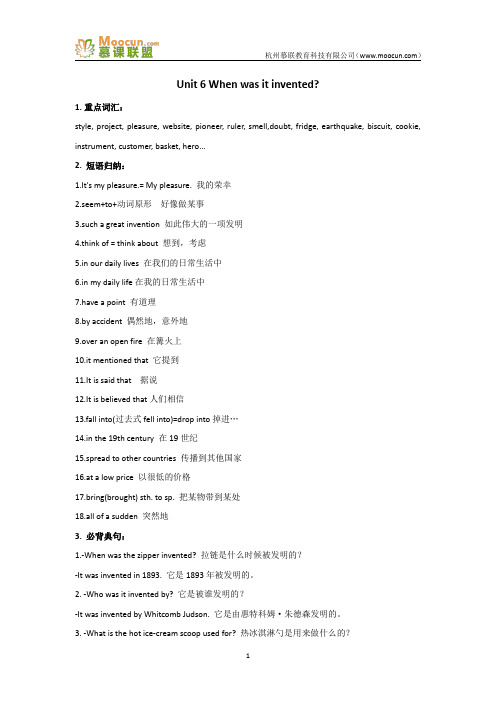
Unit 6 When was it invented?1.重点词汇:style, project, pleasure, website, pioneer, ruler, smell,doubt, fridge, earthquake, biscuit, cookie, instrument, customer, basket, hero...2. 短语归纳:1.It's my pleasure.= My pleasure. 我的荣幸2.seem+to+动词原形好像做某事3.such a great invention 如此伟大的一项发明4.think of = think about 想到,考虑5.in our daily lives 在我们的日常生活中6.in my daily life在我的日常生活中7.have a point 有道理8.by accident 偶然地,意外地9.over an open fire 在篝火上10.it mentioned that 它提到11.It is said that 据说12.It is believed that人们相信13.fall into(过去式fell into)=drop into掉进…14.in the 19th century 在19世纪15.spread to other countries 传播到其他国家16.at a low price 以很低的价格17.bring(brought) sth. to sp. 把某物带到某处18.all of a sudden 突然地3. 必背典句:1.-When was the zipper invented? 拉链是什么时候被发明的?-It was invented in 1893. 它是1893年被发明的。
2. -Who was it invented by? 它是被谁发明的?-It was invented by Whitcomb Judson. 它是由惠特科姆·朱德森发明的。
人教版英语九年级全一册第六单元知识点整理

九Unit6 When was it invented?P41 When was the telephone invented?--- I think it was invented in 1876.一般过去时的被动was/were doneP42 1. With pleasure 愿意效劳,乐意之至= all right, no problem, I’d like to2.Think about how often it’s used in our daily lives. 一现被动3.Well, you do seem to have a point…你好像确实有道理do 是助动词表强调seem to do 好像……have a point 有道理4.The pioneers of different inventions were listed there. 一过被动P43 An Accidental Inventions1.Did you know that tea was invented by accident? 偶然地,意外地表方式= accidentally=by chance2.It’s said that a Chinese ruler called Shen Nong was the first to discover tea as a drink. 据说,被动语态主动语态people say that…3.The book describes how tea plants were grown and used to make tea. be used to do 被用来做4.It is believed that tea was brought to Korea and Japan during……. It is believed 据认为was brought 被带到5.In England, it didn’t appear until around 166, but in less than 100 years, it had become the national drink. not until 直到……才不到100年之后had become 过去完成时,表示动作发生在过去的过去。
人教版九年级unit6重点知识点

人教版九年级unit6重点知识点九年级Unit6重点知识点在人教版九年级英语教材中,Unit6是一个关于旅行的单元,涉及了许多与旅行相关的话题,包括旅游景点、旅行准备、交通工具等。
本文将对Unit6中的重点知识点进行总结和讨论。
一、旅游景点在Unit6中,我们学习了一些世界著名的旅游景点,如埃菲尔铁塔、巴黎圣母院、金字塔等。
了解这些旅游景点的信息,是扩大我们的知识面,增加我们的文化素养的很好途径。
同时,我们还可以学习到一些关于这些旅游景点的地理、历史和文化知识。
二、旅行准备在出行之前,我们需要做一些旅行准备工作,包括确定目的地、预订交通工具和酒店、准备行李等。
这些准备工作能够提前规划好我们的行程,让我们的旅行更加顺利和愉快。
三、交通工具旅行中的交通工具种类繁多,我们可以选择飞机、火车、轮船、汽车等不同的交通方式。
每种交通工具都有自己的特点和优势,我们可以根据旅行的具体情况来选择最适合的交通方式。
四、旅行常用语在旅行中,我们需要用到一些旅行常用语,如问路、订酒店、购物等。
掌握这些常用语,能够帮助我们更好地交流和解决旅行中遇到的问题。
五、旅行经验分享在Unit6中,我们还学到了一些关于旅行经验的分享,如如何避免旅行中的麻烦、如何安全旅行等。
这些经验对我们日后的旅行非常有帮助,可以让我们更加顺利地度过旅程。
六、学会尊重和包容在旅行中,我们常常会遇到来自不同文化背景的旅行者。
我们应该学会尊重和包容,了解并接受不同文化的差异,避免冲突和矛盾的发生。
这不仅是对他人的尊重,也是培养自己宽容和包容心态的机会。
七、旅行对我们的意义旅行不仅是一次走出家门,观察和体验外面世界的机会,也是一次充实自我的旅程。
通过旅行,我们可以拓宽眼界、增长见识,同时也能够认识到自身的不足,激发自己的学习动力和进取心。
结束语通过学习Unit6的重点知识点,我们了解到了旅行的许多方面,包括旅游景点、旅行准备、交通工具等。
通过这些学习,我们可以更好地规划和享受我们的旅行。
人教九年级英语Unit6全单元知识点讲解
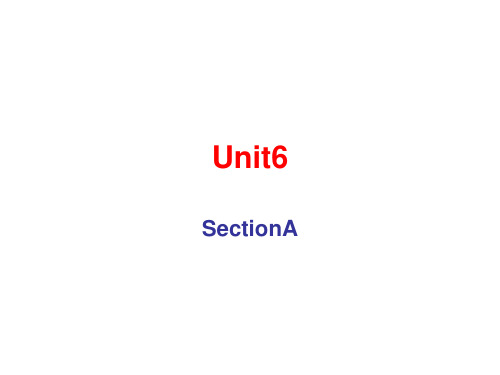
eg:---Do you know who invented the light bulb(电灯泡)?
---Edison.
拓展:
inventor n.发明家
invent v.发明
invention n.发明
Edison,a great ________,________ many
Boil the potato for 20 minutes. 把土豆煮20分钟。 Water boils at 100℃. 水在100℃沸腾。
• remain v.保持不变;剩余 ① 作连系动词,“仍然是(处于某种状态);
保持不变”=keep。其后可接形容词、名词、 分词或介词短语作表语。
eg;The room remains cool all summer. 这个房间整个夏天保持凉爽。
• by accident 偶然;意外地=by chance eg:我在街上偶然遇到了Tom。
I met Tom by accident in the street.(作 状语)
Tea was invented _b__y_a_c_c_id__en__t _.
• nearly(almost) adv.几乎;差不多 eg:我几乎从自行车上摔下来。
great _________ during his life.
• heel n.鞋跟;足跟 • scoop n.勺;铲子 • electricity n.电;电能
• style n.样式;款式;风格;方式
eg:The style of the shirt is just in season.
I wouldn't tell lies to you.That's not my style. in style流行的;时髦的 out of style过时的 a life style生活方式
人教版九年级英语unit6知识要点

Unit6 When was it invented?语法:1、被动语态(1). 被动语态表示句子的主语是谓语动词所表示的动作承受者。
(2). 被动语态基本结构:be+及物动词的过去分词(如果是不用物动词,其过去分词应带有相应的介词)(3). 被动语态中的be 是助动词,有人称、数和时态的变化。
一般现在时被动语态为:am/is/are+过去分词一般过去时被动语态为:was/were+ 过去分词与情态动词连用的被动语态:情态动词+ be + 过去分词(4). 被动语态中动作的发出者或执行者做介词by的宾语,放在句末,by 表示“由,被”的意思2、如何理解被动语态?为更清晰、更深刻地理解被动语态的含义,可以将主动语态和被动语态的句子结构进行比较。
主动语态:主语+ 谓语动词+ 宾语+ 其他成分被动语态:主语+ be +过去分词+ by +宾语+其他成分如:被动语态English is spoken by many people.课文知识要点:1、When was it invented?它是什么时候发明的?invent v. 发明→inventor n. 发明家→invention n. 发明可数名词invent v. “发明”指发明创造出自然界本来不存在的东西,如工具、方法、手段、汽车、电器、合成材料等。
Bell invented the telephone. 贝尔发明了电话。
Smith invented a new teaching method. 史密斯发明了一种新的教学方法。
Edison, a great inventor, invented over 1’000 inventions all his life.2、What is it used for?它是用来做什么的?be used for“用来做…”;此短语中的for是介词,表示用途,后接名词或动词-ing形式。
Pens are used for writing. 笔是用来写的。
人教版九年级英语unit6知识点总结
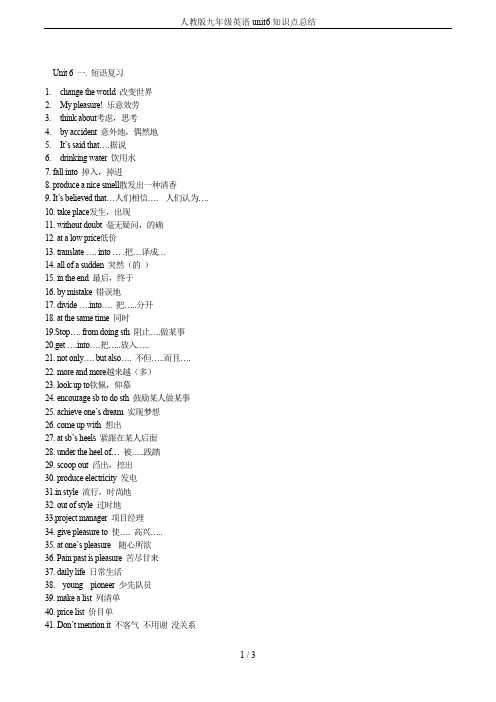
Unit 6 一. 短语复习1.change the world 改变世界2.My pleasure! 乐意效劳3.think about考虑,思考4.by accident 意外地,偶然地5.It’s said that….据说6.drinking water 饮用水7. fall into 掉入,掉进8. produce a nice smell散发出一种清香9. It’s believed that…人们相信…. 人们认为….10. take place发生,出现11. without doubt 毫无疑问,的确12. at a low price低价13. translate …. into … .把…译成…14. all of a sudden 突然(的)15. in the end 最后,终于16. by mistake 错误地17. divide ….into…. 把…..分开18. at the same time 同时19.Stop…. from doing sth 阻止….做某事20.get ….into….把…..放入…..21. not only…. but also…. 不但…..而且….22. more and more越来越(多)23. look up to钦佩,仰慕24. encourage sb to do sth 鼓励某人做某事25. achieve one’s dream 实现梦想26. come up with 想出27. at sb’s heels 紧跟在某人后面28. under the heel of… 被…..践踏29. scoop out 舀出,挖出30. produce electricity 发电31.in style 流行,时尚地32. out of style 过时地33.project manager 项目经理34. give pleasure to 使…. 高兴…..35. at one’s pleasure 随心所欲36. Pain past is pleasure 苦尽甘来37. daily life 日常生活38. young pioneer 少先队员39. make a list 列清单40. price list 价目单41. Don’t mention it 不客气不用谢没关系42.boil up 煮沸烧开43.remain calm 保持冷静44. sense of smell 嗅觉45. in doubt 可疑的不能肯定的46. sudden death 猝死47. spread to other countries 传播到其他国家48. a Chinese ruler 一位中国统治者49. over an open fire 在一堆明火上50. make tea 沏茶51. the national drink 国民饮料52. the popularity of tea 茶叶的普及53. go out alone 单独外出54. work on the invention of the telephone = invent the telephone 发明电话55.attract customers 吸引顾客56. Don’t put all your eggs in one basket 不要孤注一掷57. folk hero 民间英雄58. a much-loved and active sport 一项深受喜爱和活跃的运动59.in history 在历史上60. work together 合作61. lead to 把… 带到…. 导致62. more than 多于超出63.the personal computer 私人电脑64. take an active part in 积极参加二。
人教版九年级英语全一册知识点Unit6知识点总结
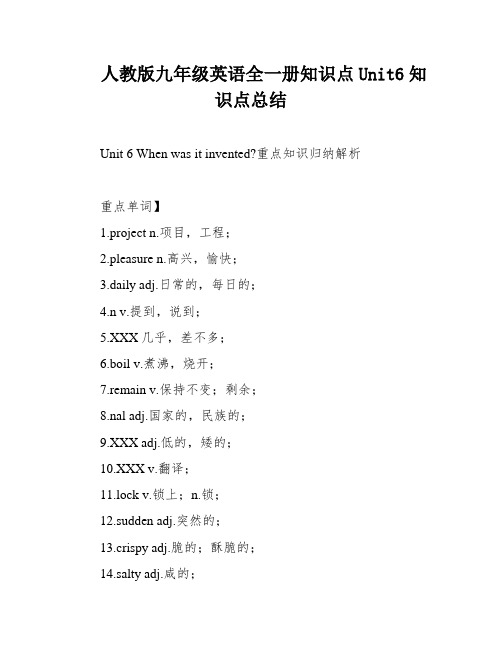
人教版九年级英语全一册知识点Unit6知识点总结Unit 6 When was it invented?重点知识归纳解析重点单词】1.project n.项目,工程;2.pleasure n.高兴,愉快;3.daily adj.日常的,每日的;4.n v.提到,说到;5.XXX几乎,差不多;6.boil v.煮沸,烧开;7.remain v.保持不变;剩余;8.nal adj.国家的,民族的;9.XXX adj.低的,矮的;10.XXX v.翻译;11.lock v.锁上;n.锁;12.sudden adj.突然的;13.crispy adj.脆的;酥脆的;14.salty adj.咸的;15.sour adj.酸的,有酸味的;16.customer n.顾客;17.Canadian adj.加拿大的;18.divide v.分开,分散;19.heron n.英雄,男主角;20.nal adj.职业的,专业的;重点词组】1.shoes with special heels 特殊后跟的鞋子2.hot ice cream scoop 热的冰其淋勺子3.run on electricity 电动的4.be used for 被用作5.the subject for my school project 学校项目的课题6.our daily lives 我们的日常生活7.have a point 有点道理8.XXX 偶然,意外地9.over the open fire 在火堆上10.fall into the water 落入水中11.take place 发生12.without doubt 毫无疑问13.at a low price 以一个很低的价格14.XXX the book into different languages 把书翻译成不同种的语言15.all of a sudden 突然16.by XXX 错误地17.a much-loved and active sport 一个深受喜爱并且积极的运动18.divide…into 把…分开19.sb from doing sth 阻止某人做某事20.look up to 钦佩,仰慕21.XXX XXX22.Borrowing someone else's idea1.In my n。
- 1、下载文档前请自行甄别文档内容的完整性,平台不提供额外的编辑、内容补充、找答案等附加服务。
- 2、"仅部分预览"的文档,不可在线预览部分如存在完整性等问题,可反馈申请退款(可完整预览的文档不适用该条件!)。
- 3、如文档侵犯您的权益,请联系客服反馈,我们会尽快为您处理(人工客服工作时间:9:00-18:30)。
人教版九年级英语第六单元知识点总结2. please v 取悦;请;→ pleasure n 愉快→pleased adj.(人)高兴的→pleasant adj.(物)令人愉快的(1)With pleasure.我的荣幸(对方提出要求,答应对方的用语。
未提供帮助前。
)(It is )a pleasure/(It is )my pleasure.我的荣幸(是对方致谢时的答语。
提供帮助后。
)--Can you help me carry the box.--With pleasure./I would love to./No problem.--Thank you--(It is )a pleasure/(It is )my pleasure.(2)be pleased to do sth 愉快做某事 be pleased with sth 对….满意It’s my _____________(please) to help you.他对这辆车很满意。
_____________________________.(3)What pleased you best?3.Don’t mention it.(1)--I am sorry.-- Don’t mention it.(2)—Thank you--Don’t mention it.4.by accident/by chanceby mistakeon purpose/by design5.nearly/almost几乎,接近。
常可替换。
(1)但有very pretty not修饰时或者具体数字前常用nearly.习语 Not nearly远非,完全不 very(pretty) nearly几乎(2)almost可用于none no never nobody nothing等否定词之前,但nearly不可。
6.take place(计划,必然) /happen (偶然)均无被动。
happen/ take placehappen v “发生”没有被动语态,强调某事发生的偶然性a. sth. happen to sb. 某事发生在某人身上What happened to you?=What was wrong with him?b. sb. happen to do sth. 某人碰巧做某事C. It happened that…碰巧(2)take place 发生,没有被动语态,指事情有计划有安排地发生take the place of 取代……位置The sports meeting took place in our school last week.The story _______in a faraway small village. What ______ to the farmer?7.without doubt=There is no doubt8.all of a sudden=suddenly9.above/below(不垂直) over/under(垂直)10.translate..into..11.call sb=telephone sb=phone sb=give sb a call=ring sb up12.not only…but (also) 就近原则13. invent v 发明→inventor n 发明家→ invention n 发明Edison , a great ________, _________over 1’000__________ all his life.(invent) discover v 发现(指发现客观存在的事物invent v 发明(指创造“发明”出来新的东西)Columbus discovered America in1492. We soon discovered the truth.14. use (1) use v 用,使用→ useful adj. 有用的 (2) use up(有被动) = run out (不及物,无被动,接名词需加of)用完,用尽 We used up the water./The water was used up by us. We run out of the water./The water run out.(3) use sth to do sth 使用某物做某事 be used for doing=be used to do sth 被用来做某事 (4)used to do sth 过去常常做某事 (5)be used to doing sth 习惯于做某事(6)be used by +动作执行者被…..使用 (7)be used as+名词被用作….(8)be useful to 对……有用Tables were used ___desks when we were young. A. by B.as C. to15. such a/an + 形容词 + 可数名词单数 = so + 形容词 + a/an + 可数名词单数such + 形容词 + 可数名词复数; such + 形容词 + 不可数名词so many/few + 可数名词复数; so much/little + 不可数名词都可和“that”连用,意思基本一样So that +句子以便,以致于用such或so填空。
(1)They made _____ much noise that our teacher got very angry.(2)Have you seen _____ an interesting film?(3)____ a little boy can only eat _____ little rice.(4)Our teacher teaches us ______ well that we are all thankful to him.(5)I took a taxi ______ that I could catch the train.(6) He left ______ hurriedly that he forgot to lock the door.16. not … until …直到……才……(谓语动词可用瞬间动词)(1)强调动作直到until 后的时间才发生。
Not 通常与首句中的be动词、助动词或情态动词连用。
否定意思是"直至某时才做某事"。
动词为延续性或非延续性(常见)都可以______________________________________ 昨天晚上她直到六点才到家。
(2)until 直到......时 (谓语动词只能用延续性动词)肯定形式表示的意思是"做某事直至某时",动词必须是延续性的I slept until midnight. 我一直睡到半夜时醒了。
17. look up to钦佩;仰慕(反义词组)→ look down on/ upon 看不起18.remain +adj保持 = stay+ adj19.It’s said thatIt’s reported thatIt’s believed thatIt’s well-known thatIt’s supposed that20.a Chinese ruler called Shen Nong= a Chinese ruler named Shen Nong21.sometime 某个时候 some time一段时间 sometimes 有时 some times几倍;几次22.hundred thousand million billion等词前如果有数字时,这些词不加s如果这些词前无数字而后有of,这些词要加s23.around=about大约24.more than=over 大于,多于less than 少于25.see/treat/regard……as 视…..为…..as 作为/因为26.the saint of sth …的圣人27.sb mentioned某人提到…28.tea plant=tea tree29.spread…to sp30. 询问价格的句型是“What is the price of +名词?=How much is/ are +名词?”。
How much is the bike? = What’s the price of the bike?【拓展】price n 价格,用形容词low或high来修饰价格,通常与介词at连用。
( )The price of the pen is not ________ for him. He is poorA. Cheap B .expensive C. high D. low31.make+宾语+ adj make the classroom cleanmake+宾语+n make him our monitormake+宾语+do make us laugh32.adj+enough enough + n33. end n/v 结尾— ending n 结尾(1)in the end = at last = finally 最后(后不接of短语)(2)at the end of…在…尽头(反)at the beginning of 在…开始(后接时间或地点名词)(3)end up doing sth 终止做某事(4) end up with sth 以…而结束最终,他结束了弹琴。
______________________________________34. think of=come up with35.stop/prevent/keep/protect…..from(1) prevent/stop/keep... from doing..表示“阻止某人做某事”例如:We must prevent the water from being polluted.What stopped him from coming here.(2) protect…from/against…表示“保护……免受……”且from不可略. 例如:We should protect our skin from being burnt in summer.Protect children from violence注意(1)s top/prevent…from…中使用主动语态时,可省略介词from,而词组keep…from的from不可省略.但在被动语态中from均不可省略.(2)F rom后跟动词主动用doing被动用being done(3)K eep sb doing sth使某人一直干某事The boss kept them working twelve hours a day(4) stop doing sth 停止做某事 Please stop speaking.请停止讲话stop to do sth 停下来去做另外一件事 Please stop to talk.请停下来讲话36.rise/raise“上升”raise是及物动词,后面必须有宾语,就是“某人把某物举起来”。
